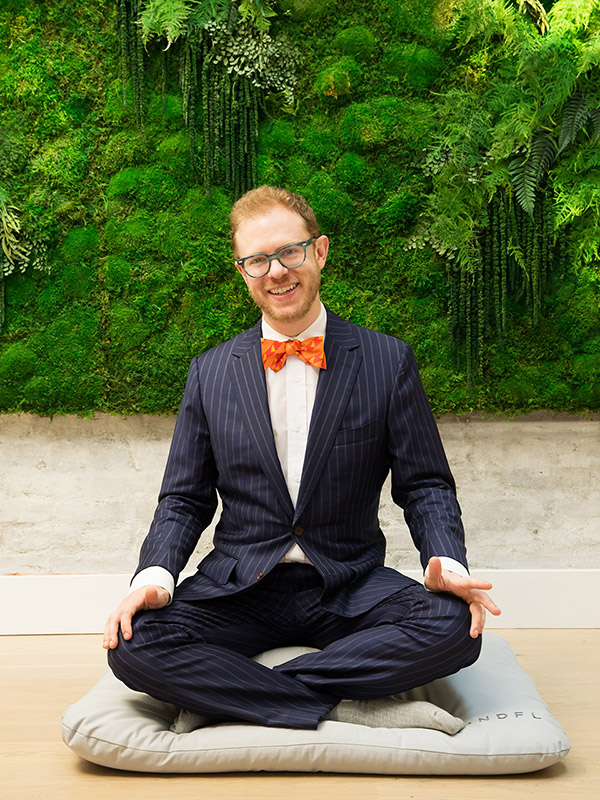
Lodro Rinzler
A Mindful Life
Interview by Kristen Noel, May 26, 2016, New York City
Photographs by Bill Miles
—
Meditation is a simple practice, but it has the power to transform the world.
Lodro Rinzler
Watch the full interview video:
Kristen: Lodro Rinzler — thank you for welcoming us into what I am sure you are now referring to as your ‘home away from home’ — MNDFL, this gorgeous new drop-in meditation studio where you serve as Chief Spiritual Officer.
Lodro: Yes. Thanks for coming.
Kristen: I’m really excited about this project — but I have to say, I am totally distracted at the moment by this incredible beauty behind us [pointing to the live green wall in the backdrop].
Lodro: Yes, we’re in the private room at MNDFL, a space that we consider to be a sanctuary. It’s often so hard to find quiet spaces and green spaces in the city. We really think this is the quietest room in all of New York City. Having this greenery is a really important element to us.
Kristen: I arrived here early today and had the opportunity of experiencing, the calm between these beautiful walls — this literally is the quietest space I’ve ever been in NYC. And everyone seems so happy here. Even the delivery people, who can be some of the crabbiest people around, were all smiles. Something is contagious here.
Lodro: It’s something really beautiful. I think we have created a space where when you walk in you can take a deep exhale. We hold our bodies so tightly all the time. In here, it’s as if your body says — Hey, I get to relax for a second.
Kristen: You walk in and it’s shoes off, phones off, mind off.
Lodro: It’s really about disconnection and connection: connecting with another human being and disconnecting from distractions.
Kristen: OK, but before we delve too much further here — indulge me and allow me to gush over your bio and background so I make sure that our audience knows who this great guy with the orange bow tie and live wall really is.
Lodro: [laughing] Sure.
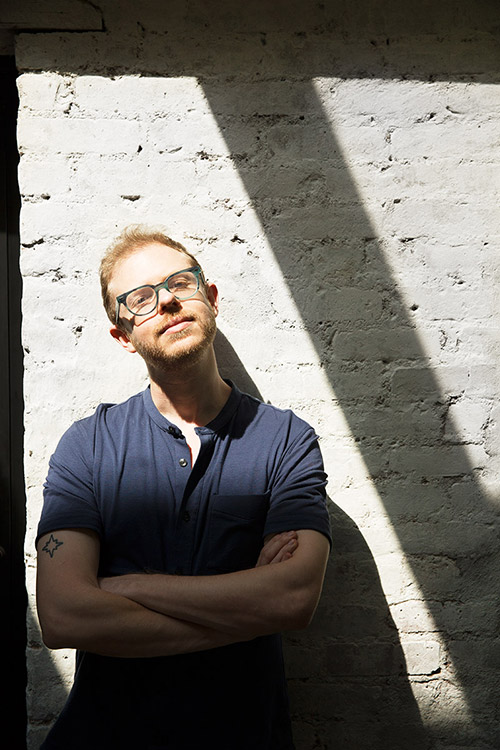
Kristen: You are a Buddhist practitioner and meditation teacher and author of five books. Fresh out of college, you were recruited to be the Executive Director of the Boston Shambhala Center, went on to serve as the Head of Development for Shambhala internationally, founded the Institute for Compassionate Leadership, The Daily Dharma Gathering and now MNDFL. You have been meditating since you were six-years-old and you spent a month before college living in a monastery. I read that you received two heirlooms from your parents before leaving for Wesleyan University: a mala and a flask, both of which you say you put to good use over the course of the next four years.
I think that is a pretty good segue into why your voice is fresh, profound, relatable and what I like to call a take-it-to-the-street-Zen-reality, sensibility. Translation: You apply your depth of wisdom and practice to every day life — bringing it from the cushion to the world.
Lodro: Thank you for that. That is very kind of you to say. You know, while I was listening to you read that, I was thinking how there are a lot of stories of people who have some sort of life event and then they discover a spiritual practice. For me, I was raised in a spiritual background. I was raised in the Shambhala Buddhist tradition, meditating from a young age, running off to the monastery, shaving my head, taking the robes — the whole nine yards. Then, only when I got to college was I like: Oh, right, ‘worldly stuff.’ I’m also going to go out to parties with friends, and I’m interested in dating, and all of these other things were making themselves known to me. It was sort of like a story in reverse in that way.
Kristen: It feels, as an outsider looking in, that all roads have led you to MNDFL.
Lodro: There’s always been this overarching intention and desire to make meditation as accessible as possible, to as many as possible. That’s always been my dream, my goal. I started a meditation group at college….
Kristen: Let’s talk about that for a minute.
Lodro: I got to college and I had been so used to meditation with groups all of my life growing up and I thought…
Kristen: Where’s my group?!
Lodro: Yeah — where’s my group? So I put up posters all around campus and was like, Come meditate with me.
Kristen: Hmmmm… keg party or meditation group?
Lodro: I think I made it a reasonable time, like one o’clock on a Sunday, so as not to interfere with the other extra-curricular activities.
People showed up and were saying, I don’t know how to meditate — I thought you were going to teach us. I thought to myself, No way, I cannot do that. Then I turned to my mentors, who all said, “Listen, you have all the qualifications — go do it.” I was very shy about it and felt pushed into it, but I also felt compelled to respond to the need there.
Kristen: Hey, you went around campus putting posters up — that took some chutzpah.
Lodro: I found a lot of people that wanted to learn to meditate and I tried to make it really helpful and applicable. I am proud to say that, we founded a little house called ‘Buddhist House;’ it’s now called ‘Middle House.’ It’s still standing and 18 people live there. They practice regularly and offer meditation. It’s amazing.
Kristen: That’s quite a legacy. Also, I want to be clear with everybody — it’s not like you were trying to convert anyone.
Lodro: Oh God No.
Kristen: It’s not like you were opening up a Buddhist Meditation Center and saying, Don’t drink, don’t party, don’t live your life. You were saying, Let’s try to incorporate all these things and let’s bring mindfulness to it. Right?
Lodro: Yes. It’s college students, right? Talking to college students about not drinking is like the same as going to a high school and saying, “Hey, no sex.”
Kristen: Just say NO!
Lodro: Just say no. It doesn’t work. College students are going to be drinking. I’m not going to say don’t drink. The real question is how do we cultivate these tools of mindfulness, so you don’t lose your mind when you are drinking, so you don’t get crazy and make mistakes.
Kristen: You had some really awesome quotes about meditation. You said, “Meditation is, indeed, hard work.” You also said, “Meditation practice can feel boring. There I’ve said it.” And, “Meditation has made me kinder, or at least less of a jerk.”
Lodro: [smiling] I will stand by all three. I think there is a lot of misconception around meditation these days, like you should be able to come into a place like MNDFL, take a 30-45 minute class and just turn off your mind. But that’s not how the mind works, right? The mind always generates thoughts and concepts and emotions. Ultimately, every time that I drift off in meditation, I can come back – no big deal. I’m not horrible for thinking during meditation. I’m not bad at this. I’m not wrong.
The more we actually befriend ourselves and treat ourselves with kindness, the more kindness we have to offer others.
Kristen: I think there are a lot of myths about meditation. For example, you don’t have to convert to Buddhism to meditate. It crosses all demographics: race, religion gender and is about a practice of centering oneself, and calming and connecting.
Lodro: Spot on. Here, at MNDFL, we’ve got these classes offered all day, every day and it’s such a cross section of New York that comes here. People from all racial backgrounds, sexual orientations, gender identities, socio-economic systems — they are all invited.
Kristen: There’s also something about taking off your shoes — it’s sort of like taking off your street armor.
Lodro: Everyone’s has their reason for starting to meditate. Some people are like, “Oh, I love the last 5 minutes of yoga.” Some say, “I’m totally stressed out at my finance job, and my doctors say they are going to put me on medication unless I do something.” Meditation is often a last resort.
Kristen: Whatever gets you here.
Lodro: They are actually able to experience a moment of peace in a really busy, chaotic day. That’s already pretty huge for them.
Kristen: Especially here in NYC, where it often feels like the epicenter of frenetic energy, stress, busyness, people moving at high speeds — you can pop out of your office, come over at lunch time, start your morning or end your day here. That’s pretty awesome. Also, people new to meditation shouldn’t be intimidated…
Lodro: Absolutely not. I would say that most of what we offer is beginner level. We have intermediate and advanced classes – and teachers adept at intuitively guiding every step of the way through your meditation, contemplation and visualization. Then they are always available for questions. There are a lot of great APPS and things like that, but at the end of the day – what we really need is this face-to-face connection. There are things you can’t ask your phone.

Kristen: Well you can… and Siri may have an answer…. Go to MNDFL @ 8 East 10th Street!
When did this idea come to you?
Lodro: After I wrote my first book, The Buddha Walks Into A Bar, I was traveling nonstop, speaking at universities and companies. I practiced in a lot of airports.
Kristen: How did you do that?
Lodro: I don’t recommend it for someone who is brand new, but at some point you feel like you can practice anywhere. Noise and busyness isn’t going to shake me out of my practice now — I’m ok with just settling in wherever I am.
For years, I kept hearing people ask over and over again, Where can I just drop in and learn to meditate without it being a religious thing?
Then one day my current business partner, Ellie Burrows, and I sat down for tea. She looked me in the eyes and said, “Why doesn’t this thing exist?” I said, “Oh My God. I’ve been thinking about this. It doesn’t exist, but we can build it.”
Kristen: Et Voila! Ask and you shall receive.
Lodro: She knew what it should look and feel like. All of this beautiful design is really Ellie. All I had to do was bring the teachers and content, which was fun for me — because I know the teachers in the Vedic, Buddhist, Kundalini lineages, the Jewish meditation teachers, Hindu meditation teachers, etc… the whole gamut.
Kristen: The rest was House Beautiful meditation history.
Lodro: It was a beautifully synergistic partnership in that regard — that we were able to balance each other in that way.
Kristen: Restaurants count their success in table seatings; I guess yours would be in cushions?
Lodro: In the six months that we’ve been open, we’ve booked over 16,000 cushions!
Kristen: Bravo!
Lodro: Yes, it’s crazy. Crazy good.
Kristen: So explain how this works.
Lodro: If you are tech savvy, great — you can book online. If not, you can just call us up. You can buy a membership with unlimited access or you can purchase a pack, a 1st time class is only $10. Private instruction is available as well.
Kristen: You also work with offices — you bring MNDFL on the road to the workplace of others, right?
Lodro: With a lot of these things we simply respond to the need.
Kristen: And God knows we need it.
Lodro: We didn’t set out to do corporate stuff, but all of a sudden, even before we opened, a lot of companies reached out and said, “We need this in our office.”
Kristen: Smart employers. It makes perfect sense. So to that point, why do we need meditation?
Lodro: They’re coming out with studies almost every day that say — whether you are meditating a little bit for a couple of weeks or everyday for a couple of weeks — all of a sudden there is this increase in brain matter in the hippocampus. What this means is that you are less impacted by stress, experience less knee-jerk reactions. Or you find that you are more productive, more efficient, you have better memory, it normalizes your sleep, it boosts your immune system.
Basically, the science is saying is that no matter what your ailment, you should give this a try. It’s going to help you. And now the Buddhists, like myself, are sitting here saying, “OK, thanks we’ve been saying this for 2600 years.” But it’s cool, because now all of a sudden, it’s not just your spiritual hippie friends saying, “You should try meditation.” It’s your doctor. It’s your therapist. It’s your Mother.
Kristen: Everyone is becoming hip to the jive… because what we are currently doing isn’t working.
Lodro: Yes, it’s the antithesis of what we normally do. We carry so much stress, so much anxiety in our bodies and in our minds. Even taking a 10-minute break is really huge.
Kristen: Right. That’s what I was thinking as you were speaking. Imagine the results this could create in high stress environments. Just think how it could transform the energy of the whole office, and the whole community.
Lodro: Yes. It does. I’m a firm believer. We can get overwhelmed, right? We look outside and think, “Oh my God, there’s so much wrong in society these days.” Instead, let’s look at our own societies, like our work society, that’s a community. I have a family society, a romantic society – that’s me and my partner. We have these little societies — how about instead saying, “Oh, I actually play an active role here.”
Kristen: And look at what I can fix in my life… in my micro-society.
Lodro: Yes — micro-societies.
Kristen: Yeah, get your nose back in your own micro-society! [laughing]
Chogyam Trungpa Rinpoche said, “The practice of meditation is not so much about the hypothetical attainment of enlightenment. It is about leading a good life.”
Lodro: Yes. I love that. Chogyam Trungpa Rinpoche was a teacher who brought these teachings from Tibet, over the mountains into India and then came west and established Shambhala centers worldwide. His whole thing was: The ultimate awakening here is Buddha-hood. But it means nothing if we are not also practicing good conduct, if we are not showing up for people in an authentic way. The whole thing is that meditation is a way that we actually start to become more present in our day-to-day life.
We were talking about the science earlier. Even after a lifetime of meditation, I don’t know if my gray matter has been increased. I do know that I am more able to be present for the wonderful and the not-so wonderful parts of my life. When I am out with friends, or on a date with my partner and we are enjoying each other’s company, I’m present — or holding my father’s hand in the hospital when we was very sick and dying. I feel very good about those things, because I was actually ‘there’ for them.
Kristen: What a blessing that you came into this world meditating. It’s taken me a lifetime to find it and when I look back on many of the dramatic events of my life, I think, If only I had had these tools then.
When I was preparing for this interview I gravitated to your book, Walk Like A Buddha. Maybe it was because the subtitle reads: Even If Your Boss Sucks, Your Ex Is Torturing You & You’re Hungover Again.
Lodro: Right. Something for everyone there. [smiling]
Kristen: Yes, it’s a poo-poo platter!
So you write. You speak. You meditate. You drink. Again, I want to go back to saying that you have this beautiful gift of taking profound spiritual text and putting it into contemporary context.
Lodro: I really thought while writing that first book, The Buddha Walks Into A Bar, that if there is just one person that started meditating as a result… mission accomplished. Of course, there are wonderfully profound teachings in Buddhism and I am trying to translate them and make them applicable to modern day life. But the end goal here is to inspire people to try meditation. If you do it, you will suddenly realize that underneath the layers of neurosis, you are basically good. You are basically OK.
Kristen: …and you might just have fun.
Lodro: You definitely want to have fun.
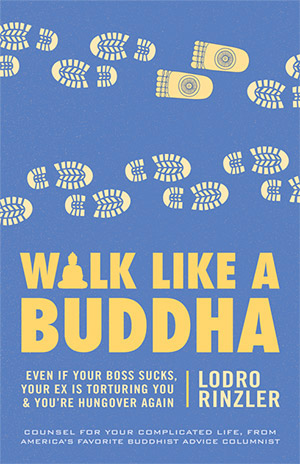
Kristen: I laughed so many times while reading Walk Like A Buddha. I want to talk about the premise of this book because it derived out of an advice column you had named What Would Sid Do? Sid, of course, being Siddhartha. You had over 100 people write in questions and nothing was off limits, nothing was taboo. You were the Dear Abby of Buddhism.
Lodro: It felt like that.
Kristen: You say that Siddhartha was a confused 20-30 something looking to learn how to live a spiritual life. Hello?
Lodro: That’s it.
Kristen: …bringing him into modern day experience, as if to say, If this guy can do it…
Lodro: …There’s no stopping us, right? We have the same ability to wake up like the Buddha did, and we’re probably coming from a similar place. People were writing me about the basic elements of our life: romantic stuff (that was a big one), work stuff, social action stuff, how to get a practice going, how do we live a more mindful and compassionate life.
Kristen: You talked about what the Buddha would do about tattoos.
Lodro: Right. This process was really fascinating to me. I actually talked to some Buddhist teachers that I respect and looked over the traditional text. In terms of tattoos – it’s about what it reminds you of; it has to be significant. If you just want to look cool – it’s ultimately going to lose significance at some point for you.
Kristen: You said, “I have never professed to being a master of anything. I’m just a guy, then again, so was Siddhartha.”
Lodro: I’m definitely not trying to derive any sort of comparison there. I’m no enlightened being. I am just a guy who has been doing this meditation thing all of his life. It’s fascinating to see that others are becoming interested. I’m glad, because it’s always been so helpful to me.
Kristen: In terms of compartmentalization, ultimately it’s about bringing the practice into all aspects of our lives, in all encounters — whether that is social media, how we’re interacting in our office, how we’re interacting in our community, how we’re judging other people. Are we judging tattoos? Are we judging people in bars, and drinking, and smoking…right?
Lodro: Yes, absolutely. Pema Chodron, the Tibetan Buddhist teacher, often talks about smoking and says, you could be as attached to your view that no one should be smoking as smokers are to their actual cigarettes. [laughing] Both cases are a form of addiction.
Kristen: You said, “I’m sort of a mess and also okay. We’re all sort of a mess.”
Lodro: That’s it. I make no pretense of being above the fray.
Underneath whatever neurosis is going on with all of us, there is this belief that right below the surface there’s peace. That’s our innate quality. From the Buddhist perspective, that is who we are. That’s our birthright.
Kristen: When you tell us what you’ve been through, and tell us that you are a mess — it’s really nice to know that meditation, Buddhism, getting centered, peacefulness… it’s not something out there, something only for other people. It’s attainable.
Lodro: You’re spot on. We all have the capacity to take 10 minutes of the day to rest and breathe, and gradually train the mind to be present — gradually train ourselves to be a little bit kinder to ourselves when we get lost in thought or make mistakes.
Kristen: We are the worst to ourselves.
Lodro: My friend has a beautiful term for that, ‘Inner Bitch Radio.’ We do all of this talking to ourselves all day long — You’re a jerk! Why did you do that? You shouldn’t have said that, etc.
Kristen: You also said in the book, “If there is a mistake to be made on the spiritual path, I’ve made it.”
Lodro: Well, I really feel like the only way I’ve learned is by studying at the feet of wonderful teachers.
Kristen: You may not give yourself enough credit, nor deem yourself an enlightened being, but you have been deemed, ‘The Cool Kid’s Buddhist.’
Lodro: Yes, by The Boston Phoenix. I’d like them to re-up it and still call me a kid.
Kristen: I want to go back to the book because of how many topics you touch upon and how many questions you answer. I thought it would be fun for us to delve into a couple of them. I’m going to throw a few subjects at you and call this ‘The Buddhist Is In Self-Help Desk.’
Lodro: Lets do it.
Kristen: Ok so how would the Buddha advise us when it comes to smoking and drinking?
Lodro: I think the important thing is that we look at our intention behind it. And I would throw sex into the mix too. Someone might ask, Can I casually date or go home with someone? Why are we doing it? Are we doing it to run away from our emotions? To tamp them down? To ignore them?
A beer by itself is neither good nor bad, but thinking makes it so. A beer can be a motivator to bring friends together. If you want to go out to reconnect with old friends and catch up, that’s a very different scenario from saying I’ve had a hard week and I’m going to drink it away. Celebrate or medicate.
Knowing our intentions is the key to all these things whether it be smoking, drinking, dating, etc. Show up fully for the activity. If you are going to smoke, actually enjoy the cigarette. If you are going to drink, have a quality drink and be there for it. If you go home with someone, don’t do all the many things that we do to leave our bodies. When we’re actually with someone, just be there.
And then there is the fruitional aspect — how do you feel afterwards? Do I feel uplifted? If we feel good, wonderful. Then that’s the thing I might want to continue to explore. If we don’t, if we feel like that was a mistake, then good news; we don’t have to do it again.
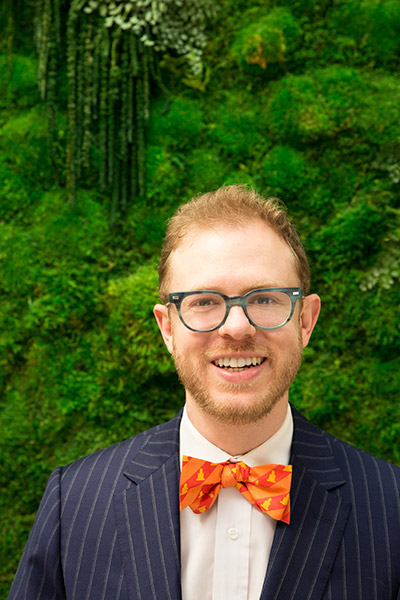
Kristen: When it comes to social media you said, “If you’re spending more time on Facebook than meditating, then you are consciously saying that you would rather live a life based on distraction than on being present.”
Lodro: I’ll stand by that, too. I think when we open up our computers, we might have the intention to work through one thing…but the next thing you know, we click over to this tab, do a little online shopping, peruse Facebook…
Kristen: We carry around these little computers disguised as smartphones. Look around no matter where you are, in a restaurant, a sporting event with your kids, etc. – you see everybody is plugged in. It’s almost as if we start twitching if we are not on social media for five minutes.
Lodro: That’s the nature of the mind. The mind is always thinking — There must be more than this. I want to do something else more interesting than I am doing right now. Meditation is the antithesis.
Kristen: Or the antidote.
Lodro: It’s like, Hey, just be here.
Kristen: So, do people actually check their phones at the desk when they arrive here?
Lodro: Yes. When people come to MNDFL for a class, one of the first things they are asked is, Do you want to check your phone at the front desk? So they actually disconnect completely. And not surprisingly, that’s why people meet each other.
Kristen: It’s getting back to conversation, a real connection.
OK, let’s move onto sports. I have to ask you, when you wrote this book you said were a Red Sox fan.
Lodro: Mm-hmmm. [affirmative]
Kristen: Living in New York Yankee territory.
Lodro: Mm-hmmm. [affirmative]
Kristen: I don’t know if you have changed your allegiance [laughing], but moving along, I wanted to bring this into the conversation because, as a parent of a young man who plays multiple sports — this notion of separation, this us against them — can get pretty ugly.
Lodro: Oh yeah. I’m reminded of this story. I think it was Chogyam Trungpa Rinpoche who was brought to a soccer game. He watched them play and remarked, “People have been doing this for thousands of years.” The commentary had nothing to do with soccer, but rather the underlying impression that we adopt this notion that I am for these people and against those people.
Kristen: We fall right into it. And I couldn’t even get my Red Sox dig in with you.
Lodro: Right. I’m not going to go there. I like all sports…
Kristen: Yeah. You had no reaction. Fine. I’m going to send you a Yankee hat.
Lodro: I spent some time living in Columbus, Ohio, working on the Obama Presidential campaign. I happened to be hosted by a family who were avid Boston Red Sox fans — and they didn’t believe that I could like the Red Sox, coming from New York. I literally lived in a basement that had wallpaper of the Red Sox Stadium…
Kristen: …Fenway. You should at least know that it is called Fenway!
Lodro: All the couches were red, they had Red Sox cushions, and in the fireplace they had the Yankee cap. I was like — Hey, I’m just here to knock on doors, please don’t make me talk about sports.
Kristen: OK, but seriously, all this Yankee/Red Sox banter aside — how do we bring mindfulness to sports? It’s not the athletes I’m talking about, it’s the parents on the sidelines, the fans in the stands.
Lodro: Ideally, this is what I recommend for those people…
Kristen: [laughing] I’m one of them.
Lodro: I call this the ‘Just Like Me’ situation. When you look at someone who is cheering for your kid to fall down so that their kid can steal the ball, you look at them and say, “They just want to be happy, just like me.”
Kristen: That’s really good.
Lodro: “They are probably struggling today…just like me.” You start to shift and think about both the positive and the negative things you have in common. “This person is pretty loud and aggressive, just like me.” You may not be in that moment, but you know what it’s like to be there…and you actually develop some empathy for them.
Kristen: I could have used that recently because I did experience something like that, with a parent in the stands who was totally out of control, almost thrown out by the referees — it was hard.
Lodro: Yeah.
Kristen: It was really difficult to muster that ‘just like me’ business in the heat of the moment when it was needed most.
Lodro: Yes.
Kristen: They don’t call it a practice for nothing. Ha. That is probably the only thing that would have brought me back.
Lodro: Just think about the commonalities.
Kristen: Moving on. Politics. I loved when you said, “I hardly think the Buddha was a hide-out-and-meditate sort of guy. He was actually radical for his time.” Going back to the Obama campaign that you worked on, tell us about the conference call you were on with him after he won the election.
Lodro: I believe you are referring to this moment of real vulnerability — and you can love Obama or hate Obama…
Kristen: …He’s just like me.
Lodro: He was just like me and he’s a human being. Obviously, I’m a fan because I spent so many months knocking on doors and talking to people about him. But afterwards, he gave this beautiful speech where he talked about how he didn’t know if we were going to win. He thought about the thousands of young people who had actually motivated themselves to go out, get off their butts, and go engage in social change.
He thought, Okay, if I lose… we still created something amazing and we still inspired thousands of young people to take on leadership positions in a compassionate way. As he was talking about this, tears came down his eyes. Here is the leader of the free world, moved to tears just thinking about the number of people who now are going to go out and do good work. That’s really what was important to him in that moment. We all started to cry.
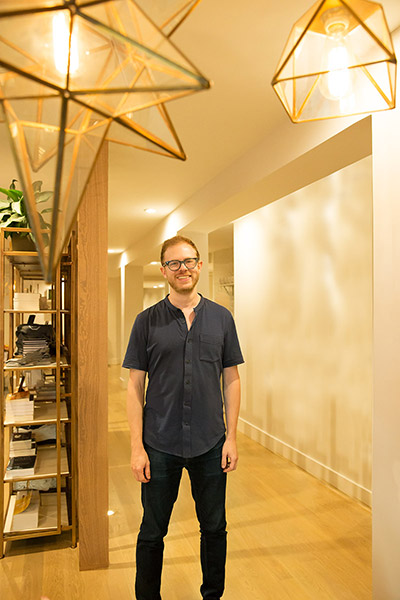
Kristen: Think about the collective energy and emotion behind that. And it’s not even about Obama, it’s just about a moment of beautiful humanness.
Lodro: Humanness and community.
Kristen: And amidst this current contentious election year, much like sports, I guess we have to keep reminding ourselves of the ‘just like me’ strategy.
Lodro: Whoever your opponent may be, if it’s Hillary Clinton, or Donald Trump, they’re just like us. You know? Whoever you think the bad guy is here…
Kristen: Just stay out of the rhetoric.
Lodro: Dropping the rhetoric, remembering that they have families and that they really mean well according to their particular point of view. They have a lot of fixed opinions, they try to push them on other people, but underneath that they actually have the same ability to wake up, like we do.
Kristen: With online dating you said, “If you’re going to online date and want to apply Buddhist principles to that act, start by presenting yourself authentically.”
Lodro: Yes. I think a lot of times, when we sit down with someone we say, “What do you want? I will give you that.”
Kristen: Who do you want me to be? I’ll be that.
Lodro: As opposed to — Here’s who I am. And who we are is innately sexy. If you see someone who is confident… that is sexy. I don’t care what they look like or what they do, it just is.
Kristen: I was laughing about your friend Ivan.
Lodro: [smiling] So, a friend of my friend Ivan was meeting someone on Match.com and asked Ivan to take a look and let him know what he thought. He had to create an account to do so and, assuming he would never go on the site again, used the screen name, ‘not-so-well-hung.’ Later that night his inbox was flooded with messages from women saying, “Oh my God, you’re so funny.”
Kristen: Funny and authentic. What a breath of fresh air. And surely his social dance card was filled.
Tell me about ‘Idiot Compassion.’
Lodro: This is an interesting one because the Buddha never taught a lay down and be a doormat sutra.
Kristen: In other words we don’t have to be ‘down’ with everything.
Lodro: Its not like, Oh, I’m a Buddhist now, I’m going to be completely complacent.
Kristen: …and make peace with everything.
Lodro: Right, it’s actually about being more empathetic and skillful in a way to help people. For example, if we end up in a situation where our friend breaks up with her abusive boyfriend, comes sleeping on our couch, crying day-in-and-day-out, it’s the millionth time this has happened, we take care of them for the millionth time… and then they wake up one day and say, “Good news, we’re getting back together.”
Kristen: [sarcastically] Great.
Lodro: You can say, Oh, I’m a good Buddhist. I’m kind. I’m happy for you… or you can say, Hey can you sit down with me for a second and talk about this, because I think there’s a cycle that you are going through that may not be helpful. They may not want to hear that, but that might ultimately be the most compassionate thing in the moment. That helps them work through their stuff.
Kristen: Benjamin Franklin said, “When you are finished changing, you’re finished.”
Lodro: It’s true. I think that’s a brilliant one. Ultimately, we’re always in evolution. We’re always changing. We’re always evolving.
I don’t think I ever thought MNDFL was the end goal. But at some point I took stock and realized: I enjoy meditation, I’m being asked to teach meditation, there’s no one talking about some of these issues, and maybe I should write a book about it so I can engage people in conversation about those issues. And here we are in a meditation studio. I think we are always changing; the only way to stop is death.
Kristen: You’ve pieced it together and created a life out of what you love.
Lodro: That’s true.
Kristen: It certainly is an idea whose time has come.
Lodro: Thank you. Six months into it, we’re doing really well, and we’re knocking on wood. We’ll respond to wherever the needs are. I think that’s a more organic long-term strategy.
Kristen: Again, I can only say that seeing is believing and I hope that anybody that is close to this area can get themselves here to experience it. Your voice transcends through your books. This space that you have created is incredible and unique. I applaud you. I thank you for sitting down with us today.
Lodro: Thanks for coming to MNDFL.
Kristen: One last thing — a wish for the world?
Lodro: That everyone could actually taste their inherent goodness. If even only for a moment.
______________________
[Editor’s Note: The ‘live’ wall that serves as the backdrop for our cover and for our video interview was created by The Sill]
